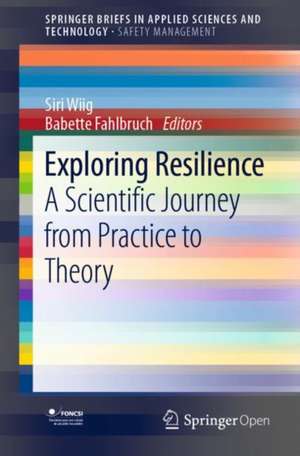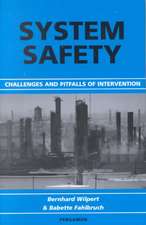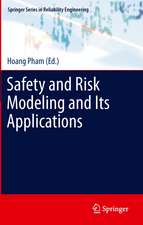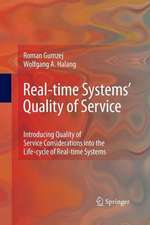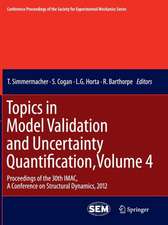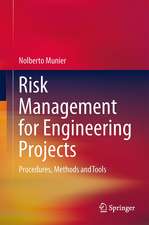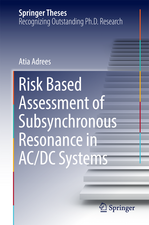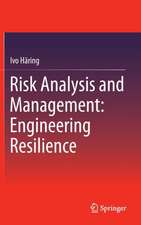Exploring Resilience: A Scientific Journey from Practice to Theory: SpringerBriefs in Applied Sciences and Technology
Editat de Siri Wiig, Babette Fahlbruchen Limba Engleză Paperback – 19 dec 2018
1. To explore different approaches for operationalization of resilience across scientific disciplines and system levels.
2. To create a theoretical foundation for a resilience framework across scientific disciplines and system levels.
By presenting chapters from leading international authors representing different research disciplines and practical fields we develop suggestions and inspiration for the research community and practitioners in high-risk industries.
This book is Open Access under a CC-BY licence.
Din seria SpringerBriefs in Applied Sciences and Technology
-
 Preț: 380.29 lei
Preț: 380.29 lei - 17%
 Preț: 360.34 lei
Preț: 360.34 lei - 20%
 Preț: 386.12 lei
Preț: 386.12 lei -
 Preț: 380.07 lei
Preț: 380.07 lei -
 Preț: 377.95 lei
Preț: 377.95 lei -
 Preț: 382.32 lei
Preț: 382.32 lei -
 Preț: 376.59 lei
Preț: 376.59 lei -
 Preț: 379.09 lei
Preț: 379.09 lei -
 Preț: 378.12 lei
Preț: 378.12 lei - 20%
 Preț: 293.83 lei
Preț: 293.83 lei -
 Preț: 344.90 lei
Preț: 344.90 lei -
 Preț: 321.36 lei
Preț: 321.36 lei -
 Preț: 264.79 lei
Preț: 264.79 lei -
 Preț: 344.90 lei
Preț: 344.90 lei -
 Preț: 356.46 lei
Preț: 356.46 lei -
 Preț: 382.95 lei
Preț: 382.95 lei -
 Preț: 355.66 lei
Preț: 355.66 lei -
 Preț: 479.67 lei
Preț: 479.67 lei -
 Preț: 415.18 lei
Preț: 415.18 lei -
 Preț: 444.52 lei
Preț: 444.52 lei - 20%
 Preț: 301.86 lei
Preț: 301.86 lei -
 Preț: 409.43 lei
Preț: 409.43 lei - 20%
 Preț: 322.17 lei
Preț: 322.17 lei -
 Preț: 355.49 lei
Preț: 355.49 lei - 15%
 Preț: 462.51 lei
Preț: 462.51 lei -
 Preț: 377.18 lei
Preț: 377.18 lei -
 Preț: 355.93 lei
Preț: 355.93 lei -
 Preț: 382.95 lei
Preț: 382.95 lei -
 Preț: 378.12 lei
Preț: 378.12 lei -
 Preț: 378.12 lei
Preț: 378.12 lei -
 Preț: 380.07 lei
Preț: 380.07 lei -
 Preț: 380.07 lei
Preț: 380.07 lei - 20%
 Preț: 326.28 lei
Preț: 326.28 lei -
 Preț: 312.68 lei
Preț: 312.68 lei -
 Preț: 356.43 lei
Preț: 356.43 lei -
 Preț: 412.30 lei
Preț: 412.30 lei - 20%
 Preț: 225.31 lei
Preț: 225.31 lei -
 Preț: 378.12 lei
Preț: 378.12 lei -
 Preț: 376.59 lei
Preț: 376.59 lei -
 Preț: 195.87 lei
Preț: 195.87 lei -
 Preț: 376.22 lei
Preț: 376.22 lei - 20%
 Preț: 324.64 lei
Preț: 324.64 lei - 20%
 Preț: 288.73 lei
Preț: 288.73 lei -
 Preț: 377.57 lei
Preț: 377.57 lei -
 Preț: 261.91 lei
Preț: 261.91 lei -
 Preț: 381.98 lei
Preț: 381.98 lei -
 Preț: 273.64 lei
Preț: 273.64 lei -
 Preț: 410.87 lei
Preț: 410.87 lei -
 Preț: 379.68 lei
Preț: 379.68 lei -
 Preț: 374.30 lei
Preț: 374.30 lei
Preț: 412.13 lei
Nou
Puncte Express: 618
Preț estimativ în valută:
78.87€ • 85.64$ • 66.25£
78.87€ • 85.64$ • 66.25£
Carte tipărită la comandă
Livrare economică 22 aprilie-06 mai
Preluare comenzi: 021 569.72.76
Specificații
ISBN-13: 9783030031886
ISBN-10: 3030031888
Pagini: 95
Ilustrații: VI, 128 p. 5 illus. in color.
Dimensiuni: 155 x 235 x 11 mm
Greutate: 0.2 kg
Ediția:1st ed. 2019
Editura: Springer International Publishing
Colecția Springer
Seriile SpringerBriefs in Applied Sciences and Technology, SpringerBriefs in Safety Management
Locul publicării:Cham, Switzerland
ISBN-10: 3030031888
Pagini: 95
Ilustrații: VI, 128 p. 5 illus. in color.
Dimensiuni: 155 x 235 x 11 mm
Greutate: 0.2 kg
Ediția:1st ed. 2019
Editura: Springer International Publishing
Colecția Springer
Seriile SpringerBriefs in Applied Sciences and Technology, SpringerBriefs in Safety Management
Locul publicării:Cham, Switzerland
Cuprins
Exploring resilience – an introduction, by Siri Wiig and Babette Fahlbruch.- Resilience, reliability, safety: multilevel research challenges, by Jean-Christophe Le Coze.- Moments of resilience: time, space and the organisation of safety in complex sociotechnical systems, by Carl Macrae.- Resilience engineering as a quality improvement method in Healthcare, by Janet E. Anderson, A. J. Ross, J. Back, M. Duncan and P. Jaye.- Resilience and Essential Public Infrastructure, by Michael Baram.- Human performance, levels of service and system resilience, by Miltos Kyriakidis and Vinh N. Dang.- Precursor resilience in practice – an organizational response to weak signals, by Kenneth Pettersen Gould.- Leadership in resilient organizations, by Gudela Grote.- Modelling the influence of safety management tools on resilience, by Teemu Reiman and Kaupo Viitanen.- Resilient characteristics as described in empirical studies on health Care, by Siv Hilde Berg and Karina Aase.- Resilience from the UnitedNations Standpoint: The Challenges of “Vagueness”, by Leah R. Kimber.- Building resilience in humanitarian hospital programs during protracted conflicts: opportunities and limitations, by Ingrid Tjoflåt and Britt Sætre Hansen.- Exploring Resilience at Interconnected System Levels in Air Traffic Management, by Rogier Woltjer.- Resilience in healthcare: a modified stakeholder analysis, by Mary Chambers and Marianne Storm.- Resilience: From Practice to Theory and Back Again, by Carl Macrae and Siri Wiig.
Textul de pe ultima copertă
Resilience has become an important topic on the safety research agenda and in organizational practice. Most empirical work on resilience has been descriptive, identifying characteristics of work and organizing activity which allow organizations to cope with unexpected situations. Fewer studies have developed testable models and theories that can be used to support interventions aiming to increase resilience and improve safety. In addition, the absent integration of different system levels from individuals, teams, organizations, regulatory bodies, and policy level in theory and practice imply that mechanisms through which resilience is linked across complex systems are not yet well understood. Scientific efforts have been made to develop constructs and models that present relationships; however, these cannot be characterized as sufficient for theory building. There is a need for taking a broader look at resilience practices as a foundation for developing a theoretical framework that can help improve safety in complex systems.
This book does not advocate for one definition or one field of research when talking about resilience; it does not assume that the use of resilience concepts is necessarily positive for safety. We encourage a broad approach, seeking inspiration across different scientific and practical domains for the purpose of further developing resilience at a theoretical and an operational level of relevance for different high-risk industries. The aim of the book is twofold:
1. To explore different approaches for operationalization of resilience across scientific disciplines and system levels.
2. To create a theoretical foundation for a resilience framework across scientific disciplines and system levels.
By presenting chapters from leading international authors representing different research disciplines and practical fields we develop suggestions and inspiration for the research community and practitioners in high-risk industries.
1. To explore different approaches for operationalization of resilience across scientific disciplines and system levels.
2. To create a theoretical foundation for a resilience framework across scientific disciplines and system levels.
By presenting chapters from leading international authors representing different research disciplines and practical fields we develop suggestions and inspiration for the research community and practitioners in high-risk industries.
This book is Open Access under a CC-BY licence.
Caracteristici
Explores different approaches for operationalization of resilience across scientific disciplines and system levels Creates a theoretical foundation for a resilience framework across scientific disciplines and system levels Develops suggestions and inspiration for the research community and practitioners in high-risk industries Presents chapters from leading international authors representing different research disciplines and practical fields
